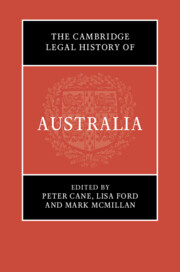Book contents
- The Cambridge Legal History of Australia
- The Cambridge Legal History of Australia
- Copyright page
- Contents
- Figures
- Maps
- Contributors
- Maps
- 1 Editors’ Introduction
- I Cultures of Law
- II Public Authority
- III Public Authorities in Encounter
- IV Land and Environment
- V Social Organisation
- 18 Colonial Law and its Control of Aboriginal and Torres Strait Islander Families
- 19 The Legal History of Non-Indigenous Marriage
- 20 Protection Regimes
- 21 Economic and Social Welfare
- 22 Civil Rights and Indigenous People
- 23 Rights
- 24 Citizenship and Immigration
- VI Social Ordering
- VII Reckonings
- Index
18 - Colonial Law and its Control of Aboriginal and Torres Strait Islander Families
from V - Social Organisation
Published online by Cambridge University Press: 04 August 2022
- The Cambridge Legal History of Australia
- The Cambridge Legal History of Australia
- Copyright page
- Contents
- Figures
- Maps
- Contributors
- Maps
- 1 Editors’ Introduction
- I Cultures of Law
- II Public Authority
- III Public Authorities in Encounter
- IV Land and Environment
- V Social Organisation
- 18 Colonial Law and its Control of Aboriginal and Torres Strait Islander Families
- 19 The Legal History of Non-Indigenous Marriage
- 20 Protection Regimes
- 21 Economic and Social Welfare
- 22 Civil Rights and Indigenous People
- 23 Rights
- 24 Citizenship and Immigration
- VI Social Ordering
- VII Reckonings
- Index
Summary
The persistence of state violence perpetrated against Aboriginal and Torres Strait Islander families is evident from first contact to contemporary child welfare interventions. These interventions have been authorised by laws and policies which have forcefully separated children from their families and communities legally and illegally, separated families through exerting control over where they could live, who could marry whom, and how their identity was legally defined. These laws and policies have also systematically excluded Aboriginal and Torres Strait Islander families from opportunities and benefits for wealth creation, laying the foundations for inter-generational experiences of poverty and trauma. The shift from formal discrimination under the auspices of ‘protection’ to assimilation saw an increase in interventions and removal of Aboriginal and Torres Strait Islander children from their families. There is continuity across different laws and policies in the presumptions about western family superiority, the embedding of non-Indigenous priorities and aspirations in law and policy, and the failure of the state to take responsibility for inter-generational harms perpetrated, or a willingness to relinquish power exercised over Aboriginal families.
- Type
- Chapter
- Information
- The Cambridge Legal History of Australia , pp. 433 - 455Publisher: Cambridge University PressPrint publication year: 2022
- 2
- Cited by



